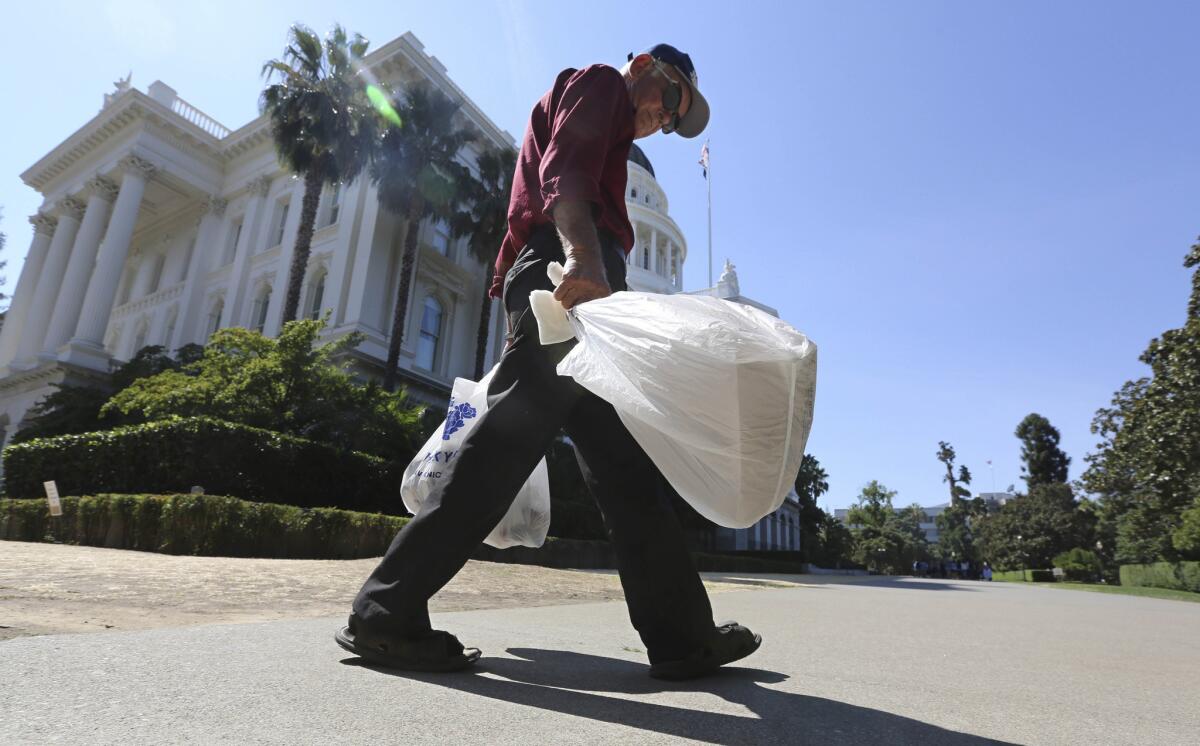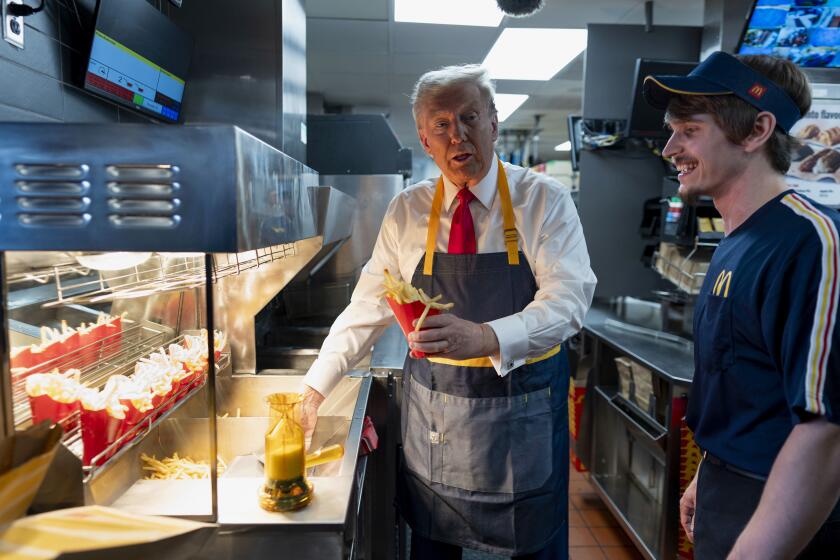Why are there two plastic bag ban propositions on the California ballot?

- Share via
When voters go down the list of the 17 statewide propositions on their ballots this November, they could be confused when they reach two measures placed there by a trade group seeking to overturn the state’s landmark 2014 ban on plastic bags.
The most straightforward is Proposition 67, a referendum asking voters to either vote yes to preserve the law or no to reject the statute, which bans disposable plastic bags and lets grocers charge customers 10 cents for paper bags or more durable reusable plastic bags.
But even if voters keep that law in place, they could also alter the law by approving Proposition 65, an initiative that would send the proceeds from that 10-cent fee to a state fund for environmental projects.
Both propositions qualified for the ballot thanks to signature gathering efforts paid for by the plastic industry’s trade group, the American Progressive Bag Alliance.
The group has put up a fierce fight as similar plastic bag bans have been passed in cities and counties across California. They took the fight to the ballot box after Gov. Jerry Brown signed a statewide ban that was approved by the state Legislature in 2014.
Environmentalists who back the ban argue that the bags contribute to a litter problem and clog the state’s waterways while endangering animals.
But the plastic industry’s group says the bags do little harm, and the ban will cost the state around 2,000 manufacturing jobs. Lee Califf, executive director of the alliance, has criticized the bill, calling it “a backroom deal between the California Grocers Assn. and their union friends to scam consumers out of billions of dollars in bag fees.”
Four out-of-state plastic bag manufacturers have provided 97% of the contributions to the American Plastic Bag Alliance, which is the only committee working to defeat Proposition 67 and pass Proposition 65, according to MapLight, a nonpartisan organization that tracks money in politics.
The companies, including South Carolina-based Hilex Poly and Texas-based Formosa Plastics, have poured more than $5 million into the political committee.
Voters also have to consider how the two measures affect one another: If both pass, the revenue from bag sales would go to grocers if Proposition 67 is approved with more votes. If Proposition 65 passes with more votes, the funds would go to the environmental fund.
Updates on California politics »
An analysis by the independent Legislative Analyst’s Office also raised the possibility that if Proposition 65, the initiative redirecting the funds, gets more votes than the referendum, a court could prevent a ban from going into effect at all.
Kim Alexander, president of the nonpartisan California Voter Foundation, said that although the ballot often has multiple measures dealing with the same issues, this case is peculiar.
“What is unusual is for the same group to be proposing more than one measure on the ballot and having those measures operate somewhat in conflict,” she said.
Mark Murray, executive director of the environmental group Californians Against Waste, accused the plastics trade group of trying to confuse voters.
Given the other high-profile issues on the ballot such as legalizing marijuana and repealing the death penalty, the average voter, even if he or she approves of a plastic bag ban, might not know which one to vote for, Murray said.
It is worth noting, he said, that the initiative, Proposition 65, comes before the referendum, Proposition 67. That could affect voters too, he said.
“They may remember, ‘There is the thing I am supposed to vote ‘yes’ on, but I voted ‘yes’ on this first one, I think I should vote no on the second one,” he said.
Jon Berrier, a spokesman for the alliance, said the initiative is not meant to confuse voters but instead to offer them the chance to make sure that the fees collected “have some public purpose” and provide direct environmental benefits.
The Legislative Analyst’s Office analysis said that fee revenue could reach several tens of millions of dollars annually, but that depends on the level of future bag sales and the prices of carryout bags.
Opponents of Proposition 65, including the San Diego branch of the Surfrider Foundation, have criticized the measure as a ploy to divide environmentalists and smaller grocers who could use the fees to cover the cost of durable bags.
The law would not affect local bag bans, which are on the books in 150 cities and counties in the state, according to the Legislative Analyst’s Office. Those local laws cover about 40% of California’s population, mostly in more liberal coastal counties in the Los Angeles area and the Bay Area, according to the analysis.
Twitter: @jpanzar
ALSO
If Proposition 55 passes, the state budget will rely even more on California’s highest earners
Your ballot box guide to California’s 17 propositions
Most Californians support initiative to require adult-film actors to use condoms
Updates on California politics
More to Read
Get the L.A. Times Politics newsletter
Deeply reported insights into legislation, politics and policy from Sacramento, Washington and beyond. In your inbox three times per week.
You may occasionally receive promotional content from the Los Angeles Times.











